This article was medically reviewed by Sari Eitches, MBE, MD. Dr. Sari Eitches is an Integrative Internist who runs Tower Integrative Health and Wellness, based in Los Angeles, California. She specializes in plant-based nutrition, weight management, women's health, preventative medicine, and depression. She is a Diplomate of the American Board of Internal Medicine and the American Board of Integrative and Holistic Medicine. She received a BS from the University of California, Berkeley, an MD from SUNY Upstate Medical University, and an MBE from the University of Pennsylvania. She completed her residency at Lenox Hill Hospital in New York, NY and served as an attending internist at the University of Pennsylvania.
There are 21 references cited in this article, which can be found at the bottom of the page.
wikiHow marks an article as reader-approved once it receives enough positive feedback. In this case, several readers have written to tell us that this article was helpful to them, earning it our reader-approved status.
This article has been viewed 331,006 times.
You've felt it: that afternoon slump when you can't keep your eyes open at work. The best way to deal with that type of drowsiness is to ensure you get enough good quality sleep at night, thus preventing the drowsiness in the first place. However, if you still find yourself drowsy, you can make a few lifestyle changes to increase your energy overall, as well as use a few tricks to up your alertness when drowsiness does hit you.
Steps
Practicing Good Sleep Hygiene
-
1Slow down on caffeine. Caffeine is great to wake you up in the morning. However, it can also keep you up at night. Stop drinking caffeine within 4 to 6 hours of going to bed to reduce the chance of it keeping you awake at night.[1]
-
2Skip the cigarettes. Nicotine keeps you awake, so quitting smoking is a must if you want better sleep. Also, your cravings may be keeping you awake or making you more restless at night.[2]Advertisement
-
3Check your pills. Certain medications can keep you awake, such as antidepressants and asthma medications. Ask your doctor if your pills could be keeping you up, and he or she may be able to help rearrange your medications for more restful sleep.[3]
-
4Get your exercise in. Studies show that exercisers tend to sleep better. However, the actual act of exercising wakes you up because it releases cortisol into your body, so you should exercise earlier in the day to sleep better.[4]
-
5Don't eat a large meal before bed. To help you sleep, don't try to eat a huge amount just before sleeping, as problems such as indigestion can keep you up. Try to eat larger meals at least a couple of hours before going to sleep.[5]
-
6Keep a sleep schedule. Your body likes routine. If you go to bed every night at the same time and wake up at the same time everyday, your body knows when it needs to get sleepy and when it needs to be awake.[6] Stick to your schedule even on weekends, and you'll have more restful nights.[7]
- One way to keep yourself on schedule is to set an alarm or reminder to tell you to go to bed. That way, you won't stay up past your bedtime without noticing.
- If you're having trouble getting enough sleep, try going to bed a little earlier every night until you're getting the recommended 7 to 8 hours of sleep.[8]
-
7
-
8
-
9Kick your pets out. While your kitty might like to curl up at the foot of your bed, a pet's nighttime movements can wake you up. If you find yourself waking up often because of your pets, you may need to shut them out of your bedroom.[13]
-
10
-
11Take note of your worries. If you lay awake thinking about who you need to call or what you need to do tomorrow, trying writing a few notes about it before bed, including a plan of action. That way, you can let your mind relax and go to sleep.[16]
Using Everyday Healthiness to Stay Alert
-
1Drink enough fluid. Dehydration can make you feel tired, so be sure to drink water frequently, especially when your body is telling you it's thirsty.[17]
- To help you get enough water, remember that coffee, tea, and even fruit juice count as part of your total.[18] To spice up your water, try drinking sparkling water with a slice of orange or lemon in it.
-
2Focus your lunch on protein, vegetables, and complex carbohydrates.[19] While it may be tempting to reach for a candy bar after lunch, the sugar in it may be your downfall for the afternoon slump. Instead, try complex carbohydrates such as whole grains, vegetables, and fruits, paired with a lean protein such as fish or chicken.[20]
-
3Change your position. Try bringing your shoulders up, so your whole body is straighter. Leaning over can make you sleepier.[21]
- Another option is a position that requires you to balance yourself. For instance, some people use yoga ball chairs to improve their balance, but they can also help keep you awake.
-
4Don't stay on one task too long. Staying on one task only for hours at a time can lead you to brain burn out and sleepiness. Instead, switch tasks if you notice your brain is wearing out. It will help keep you more alert.[22]
Using Tricks to Jolt Yourself When You're Feeling Sleepy
-
1Drink some caffeine. Caffeine does work to keep you awake by blocking adenosine, a neurotransmitter designed to tell your cells to wind down.[23] However, because caffeine doesn't work as well the more you use it, try to only drink it every once in a while, rather than every day.
- Start with something lighter on the caffeine, such as green tea. If you need something stronger, black tea and coffee both have more caffeine.[24]
-
2Stretch your body. You are limited in your office as to how much stretching you can do, but you can perform a few simple stretches.[25]
- For instance, pull your hands together behind your back, stretching out the front of your body. Breathe deeply for a few seconds, then let go of your hands. Do it a couple of times in a row.
- Try stretching out your hips. Turn in your chair until you are facing to the left. Lift your right leg out behind you, stretching it straight. Try to keep the top half of your body sitting up straight. Repeat the stretch a couple of times, and then turn to do it with the other leg.
-
3Use scents. That is, try a wax-melting system in your office or use essential oils. Scents such as peppermint, eucalyptus, and lemon may help keep you alert.[26]
-
4Get out of your chair. Some offices will let you work at a standing desk, which increases movement and alertness. If that doesn't sound like something you'd want, try moving around when you take breaks. Get up and take a short walk to increase your alertness. You'll do even better if you can step outside for a few minutes in the sun, as it sends signals to your body to wake up.[27]
-
5Try an energy-boosting supplement. Most supplements rely on calories, stimulants, or nutrients that affect how your body metabolizes energy. You're getting energy from your power lunch, and caffeine is a stimulant. However, if you still need a boost, you might try a supplement that focuses on boosting your metabolizing, with ingredients such as creatine, CoQ10, B vitamins, and taurine.
-
6Try a short cat nap. If you have the space and the time, try taking a short 10 to 20 minute nap over your lunch break. These types of naps can help refresh your brain without causing drowsiness. In fact, it's natural to feel some afternoon drowsiness. At about 7 hours after you wake up in the morning, your body calls for a break, and a short nap can help fulfill that need.[28]
Expert Q&A
Did you know you can get expert answers for this article?
Unlock expert answers by supporting wikiHow
-
QuestionHow do you get rid of sleepiness?
 Sari Eitches, MBE, MDDr. Sari Eitches is an Integrative Internist who runs Tower Integrative Health and Wellness, based in Los Angeles, California. She specializes in plant-based nutrition, weight management, women's health, preventative medicine, and depression. She is a Diplomate of the American Board of Internal Medicine and the American Board of Integrative and Holistic Medicine. She received a BS from the University of California, Berkeley, an MD from SUNY Upstate Medical University, and an MBE from the University of Pennsylvania. She completed her residency at Lenox Hill Hospital in New York, NY and served as an attending internist at the University of Pennsylvania.
Sari Eitches, MBE, MDDr. Sari Eitches is an Integrative Internist who runs Tower Integrative Health and Wellness, based in Los Angeles, California. She specializes in plant-based nutrition, weight management, women's health, preventative medicine, and depression. She is a Diplomate of the American Board of Internal Medicine and the American Board of Integrative and Holistic Medicine. She received a BS from the University of California, Berkeley, an MD from SUNY Upstate Medical University, and an MBE from the University of Pennsylvania. She completed her residency at Lenox Hill Hospital in New York, NY and served as an attending internist at the University of Pennsylvania.
Integrative Internist It's important to know that the quality of the sleep you are getting is as important as the number of hours you get. Make sure your sleep environment is as conducive to restful sleep as possible. If you're somewhere in the city where it's loud, you could consider buying a sound machine. If there is too much light in your room and you do not have blackout curtains, think about purchasing an eye mask.
It's important to know that the quality of the sleep you are getting is as important as the number of hours you get. Make sure your sleep environment is as conducive to restful sleep as possible. If you're somewhere in the city where it's loud, you could consider buying a sound machine. If there is too much light in your room and you do not have blackout curtains, think about purchasing an eye mask. -
QuestionWhy can't I sleep at night?
 Shari Forschen, NP, MAShari Forschen is a Registered Nurse at Sanford Health in North Dakota. Shari has worked in healthcare since 1996 and her expertise lies in acute care bedside nursing on a medical oncology floor. She received her degree from Medcenter one College of Nursing in 2003 and her Family Nurse Practitioner Masters from the University of North Dakota in 2014. Shari is a member of the American Nurses Association.
Shari Forschen, NP, MAShari Forschen is a Registered Nurse at Sanford Health in North Dakota. Shari has worked in healthcare since 1996 and her expertise lies in acute care bedside nursing on a medical oncology floor. She received her degree from Medcenter one College of Nursing in 2003 and her Family Nurse Practitioner Masters from the University of North Dakota in 2014. Shari is a member of the American Nurses Association.
Master's Degree, Nursing, University of North Dakota
References
- ↑ https://www.heretohelp.bc.ca/wellness-module/wellness-module-6-getting-a-good-nights-sleep
- ↑ https://www.betterhealth.vic.gov.au/health/conditionsandtreatments/sleep-hygiene
- ↑ https://www.heretohelp.bc.ca/wellness-module/wellness-module-6-getting-a-good-nights-sleep
- ↑ http://healthysleep.med.harvard.edu/healthy/getting/overcoming/tips
- ↑ http://healthysleep.med.harvard.edu/healthy/getting/overcoming/tips
- ↑ Sari Eitches, MBE, MD. Sleep Specialist. Expert Interview. 3 April 2020.
- ↑ https://www.healthnavigator.org.nz/healthy-living/s/sleep-tips/
- ↑ https://sleepeducation.org/healthy-sleep/healthy-sleep-habits/
- ↑ Sari Eitches, MBE, MD. Sleep Specialist. Expert Interview. 3 April 2020.
- ↑ https://www.betterhealth.vic.gov.au/health/conditionsandtreatments/sleep-hygiene
- ↑ Sari Eitches, MBE, MD. Sleep Specialist. Expert Interview. 3 April 2020.
- ↑ https://web.ntw.nhs.uk/selfhelp/leaflets/Sleeping%20Problems.pdf
- ↑ https://edition.cnn.com/2021/11/05/health/sleeping-with-pets-wellness/index.html
- ↑ Sari Eitches, MBE, MD. Sleep Specialist. Expert Interview. 3 April 2020.
- ↑ https://www.cci.health.wa.gov.au/~/media/CCI/Mental-Health-Professionals/Sleep/Sleep---Information-Sheets/Sleep-Information-Sheet---04---Sleep-Hygiene.pdf
- ↑ https://www.sleephealthfoundation.org.au/anxietyandsleep.html
- ↑ https://my.clevelandclinic.org/health/treatments/9013-dehydration
- ↑ https://www.cdc.gov/nutrition/data-statistics/plain-water-the-healthier-choice.html
- ↑ Sari Eitches, MBE, MD. Sleep Specialist. Expert Interview. 3 April 2020.
- ↑ https://www.healthnavigator.org.nz/healthy-living/s/sleep-how-food-drink-affects/
- ↑ http://www.urmc.rochester.edu/encyclopedia/content.aspx?ContentTypeID=1&ContentID=2746
- ↑ https://www.bbc.com/worklife/article/20210401-how-to-stay-awake-and-alert-at-work
- ↑ https://www.urmc.rochester.edu/encyclopedia/content.aspx?contenttypeid=1&contentid=2746
- ↑ https://www.uptodate.com/contents/image?imageKey=OBGYN%2F79304
- ↑ https://www.bbc.com/news/world-us-canada-49050936
- ↑ https://rightasrain.uwmedicine.org/body/rest/staying-awake-after-poor-sleep
- ↑ http://sleepfoundation.org/shift-work/content/tips-staying-awake-the-job
- ↑ https://www.nm.org/healthbeat/healthy-tips/caffeine-free-strategies-to-stay-energized
About This Article
To avoid sleepiness at work, start by standing up and doing some light stretches whenever you feel drowsy to perk yourself up and combat muscle fatigue. When you have a break, walk around outside if possible, because sunshine will send your body signals to wake up. If that doesn’t work, drink a cup of coffee or strong black tea to give yourself a boost of energy. You can also use essential oils such as peppermint and eucalyptus to keep you more alert. For tips from our Medical reviewer on getting better sleep at night so you’re not tired during the day, read on!

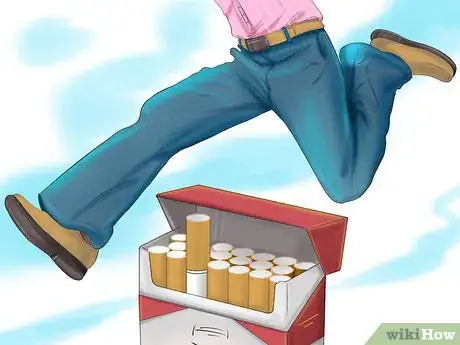
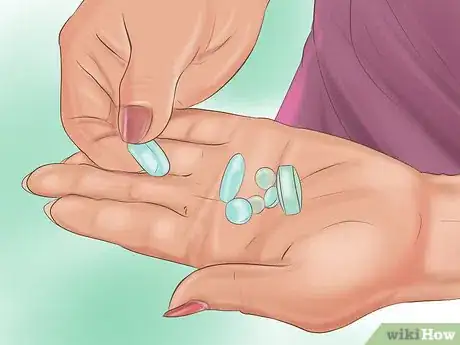
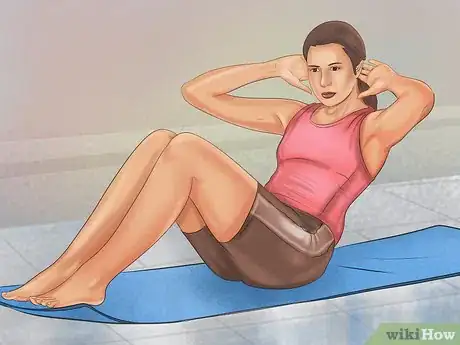
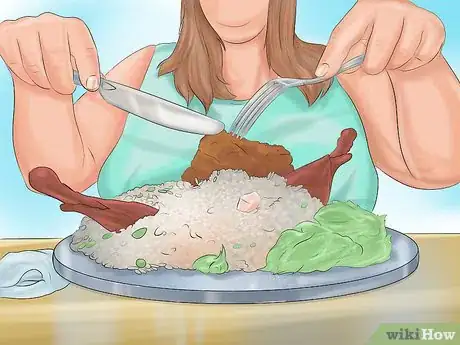
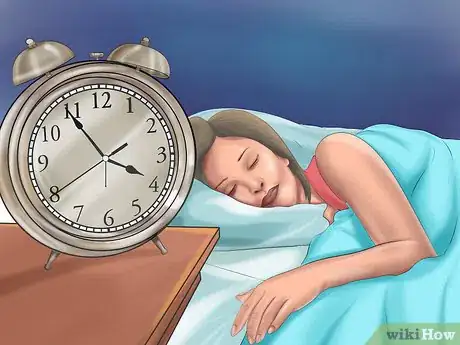


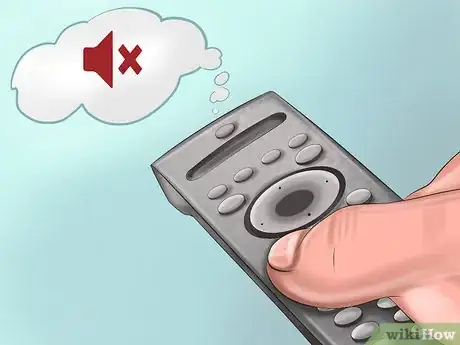





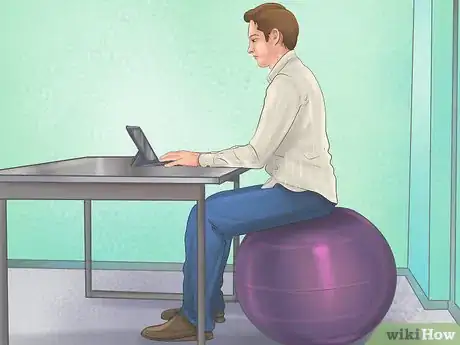


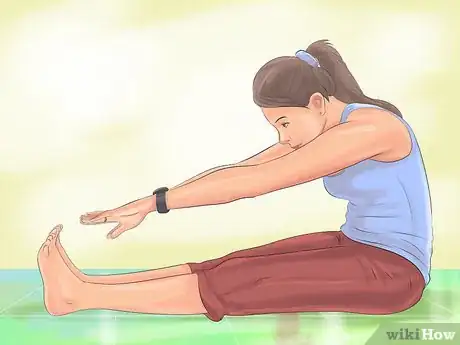



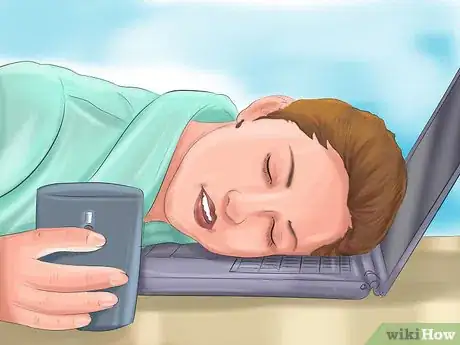






























































Medical Disclaimer
The content of this article is not intended to be a substitute for professional medical advice, examination, diagnosis, or treatment. You should always contact your doctor or other qualified healthcare professional before starting, changing, or stopping any kind of health treatment.
Read More...